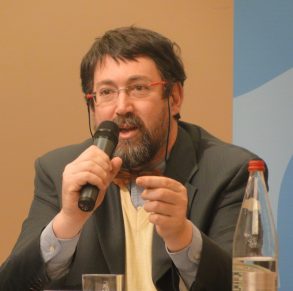On Tuesday 21 of June 2016, I was on the French « Sénat[1] » along with Mathieu Weill and other eminent specialists of Internet governance to take stock with senators on progress since the submission, in July 2014, of the report “Europe to the rescue of the Internet”[2].
During this meeting[3], I shared the following ideas. I think they can inform the debate on the future of ICANN. A few days from the ICANN meeting in Helsinki, where the issue of diversity will, I hope, be a main issue.
This exchange is particularly welcome because of its double implication:
- French parliamentarians are interested in the future of Internet governance and especially in this case in the unique identifiers managed by ICANN,
- The United States and their Congress are not the only one affected by these issues.
Since 1997, my commitment has always been on the user side.
First with SNCF, to set up an e-mail system for all employees and the travel website that replaced the Minitel.
Then from 2000 to 2004 at CIGREF to express the needs of large French companies.
Starting in 2004 as president of ISOC France, which I am now honorary president, to be the voice of Internet end-users, locally, regionally and globally.
At ICANN, I was and am again member of ALAC (At-Large Advisory Committee); in between I was from 2010 to 2014 the first member of the Board representing users within the current structure.
Since 2013, I am a director of AFNIC and I have just been re-elected for the next four years.
I am a member of the multi-stakeholder working group on ICANN accountability where Mathieu Weill is one of the co-chairs.
I will not repeat the content of my hearing before the Senate information mission, which published a report in 2014 on the “new role and [the] new strategy for the European Union in the global Internet governance”. This hearing allowed me to explain the role of users in ICANN and more generally in Internet governance.
The role of users in ICANN, represented by nearly 200 structures worldwide, remains central to what we will discuss today. They are a component of a multi-stakeholder structure.
As said by Jean-François Abramatic, one of the pioneer of the Internet in France, at the same hearing, “ICANN is in charge of “only”, but it is important, the management of IP addresses, protocols, and domain names.”
Our round table theme is: “What international oversight of ICANN?”
Before focusing on the question of the type of supervision. It would be useful to see if any supervision is required.
The question of internationalization of ICANN goes in hand with privatization.
According to the adopted perspective, one wonders what will change and what might change in the role and functioning of ICANN.
I will try to give you my perspective retracing some facts that have marked at the time of the creation of ICANN, but especially since 2014.
March 14, 2014, the US Government (NTIA[4] – National Telecommunications and Information Administration) announced its intention to transfer its role in supervising the IANA functions (DNS – Domain Name System and IP addresses) to the global multi-stakeholder community. Since then, the ICANN community and more broadly all those concerned with Internet governance issues, have been working to define the appropriate framework for this transition.
Two complementary approaches have been followed[5]. One that has defined the conditions of the transfer of responsibility of the IANA oversight, and the other, new accountability mechanisms of ICANN (since ICANN would play an important role) to implement the transition. On March 10, 2016, at the ICANN meeting in Marrakech, the transition plan has been finalized and submitted to the NTIA.
As Mathieu Weill (CEO of AFNIC and co-president of one of two working groups of ICANN) has declared in his speech[6] during the ICANN Board public meeting in Marrakech:
The Pact of Marrakech “consists of two parts, and only two parts:
- The community, open and multistakeholder, and the board of ICANN hold each other accountable to act in the global public interest within the scope of the ICANN mission.
- Within ICANN, each of us has a role and responsibilities, and we respect and recognize the value of these roles and responsibilities, by acting on an equal footing.”
This “Pact of Marrakech”, after an analysis of nearly three months where the NTIA[7] has found that the proposal adequately addresses the requested principles, will now be considered by the United States Congress. It also gives rise to statements from many stakeholders.
I would like to come back to different events or various points of view expressed recently.
Privatization[8]
In its announcement, the NTIA (see note1) repeated the assurances given by the Department of Commerce in 1998: the government of the United States “is committed to a transition that will allow the private sector to take leadership for DNS management.”
On March 17, 2016, one week after the completion of the “Pact of Marrakech”, the US House of Representatives held a hearing[9] on “Privatizing the Internet Assigned Number Authority” where stakeholders representing various American actors explained why Icann could be “privatized”.
On April 19, 2016, Stephen D. Crocker, the current Chair of the ICANN Board, published an article in the Wall Street Journal under the title:
“Broadening the Oversight of a Free and Open Internet – Stewardship by the global community will guard against ‘capture’ by one group or government.”
He also spoke of privatization. The Internet “is built on the principles that define America: free enterprise and limited government. It is those same ideals of privatization that frame a proposal recently sent to the National Telecommunications and Information Administration that would transition stewardship of some key Internet technical functions away from the U.S. to a diverse and accountable global Internet community.”
On March 24, in a press release[10], Axelle Lemaire, French government State Secretary for Digital says[11] that “some elements of the reform project will result in marginalizing States in the ICANN decision process, especially compared to the role given to the private sector.”
In a article of “Le Monde“[12] entitled “Paris denounced a “privatization” of Internet governance”, one could read the following comments from the French Ministry of Foreign Affairs dated 23 March 2016:
“Private interests will now overwrite the interests represented by the governments”;
“We are in the privatization of ICANN, not in its internationalization. The United States takes back with one hand what they give with the other.”
Internationalization[13]
As we have seen, the Foreign Ministry wishes internationalization of ICANN. This is also the view of Axelle Lemaire in the already quoted statement: “The Internet is now a global common good, it is critical that its governance bodies become truly international, transparent and democratic (…)”.
In the announcement of the NTIA, the only reference to the word international is as follows: “At the same time, international support continues to grow for the multi-stakeholder model of Internet governance, as evidenced by the continued success of the Internet Governance Forum (…).”
The question before us today “What international oversight of ICANN?” goes even further as it suggests the need for an ICANN oversight, whose nature remains to be defined, but would be international.
Privatization, internationalization or multi-stakeholder
It is interesting that the hearing of the US Senate on May 24, 2016 had the following title: “Examining the Multistakeholder Plan for Transitioning the Internet Assigned Number Authority”. During this hearing, various American actors expressed their agreement or disagreement with the proposed transition plan.
Are we dealing with privatization of ICANN (which was planned from 1998) in contradiction of a desired internationalization by some States?
Since 1998, much has changed. We see a greater participation of all stakeholders, especially government officials and Internet users. A debate has opened on the role and place of governments and users, not just with large US corporations.
It is therefore time to support a multi-stakeholder solution that would allow giving a voice to everyone and all.
Is the “Pact of Marrakech” is the best possible? Certainly not, but it allowed anyone who wanted to express themselves to do so. It did not take into account all the views expressed by the members and participants of the working group on ICANN reform. But it is a compromise that we need to make alive.
Supervision[14]
As we have seen with this transition of the US government’s responsibility in the IANA function and significant changes in the accountability and governance of ICANN, we are entering a new era. Why should we add oversight to the structural evolution of ICANN towards an organization where equality of stakeholders is getting better taken into account?
In fact, and this is what is proposed in the “Pact of Marrakech”, ICANN should “self-monitor”. This is what the Board and the community (representing the main stakeholders, including governments and users) will do mutually.
But this is only one step, certainly important but not final.
The opinion of the US Congress and the final decision of the government of that country are expected before the end of the contract with ICANN in September 2016.
But for the community, the work continues as, during the next ICANN meeting, late June in Helsinki, a second phase of work will begin. It must cover 9 topics.
One year ago, following the publication of the first draft report on ICANN accountability, I made a public comment[15] with a chapter entitled “Diversity, an absolute need.” Now one of the 9 topics in this next phase will be precisely addressing diversity. In France, at the invitation of the public authorities, a group that includes AFNIC and the International Organization of La Francophonie, and to whom I am pleased to participate, began a reflection on this vital topic.
Giving a voice to each and everyone needs that all diversities are taken into account. The various dimensions to take into account could be:
- languages: mother tongue (and father tongue) and those used regularly;
- cultures;
- genders;
- ages;
- types of stakeholder;
- skills;
- geographical situations: country and region of origin and of residence.
Already, when only the geographical diversity is ensured, it is unfortunate that those who are chosen to represent the four regions of the world outside North America have often been educated at a US university.
For ICANN, the objective should not be its privatization nor its internationalization, nor his supervision, but an open, global, multi-stakeholder that actually promotes diversity. For this, a mobilization of French actors should be enhanced. And let me finish by parodying a political slogan of the 19th century: Users of all countries, Mobilize yourselves!
Senate – Study Group “Digital Society” – Roundtable
“What international oversight of ICANN? “
June 21, 2016
[1] http://www.senat.fr/espace_presse/actualites/201606/quelle_supervision_internationale_de_licann.html
[4] http://www.ntia.doc.gov/press-release/2014/ntia-announces-intent-transition-key-internet-domain-name-functions
[6] https://www.afnic.fr/en/observatory-and-resources/expert-papers/speech-at-the-transmittal-of-the-iana-stewardship-transition-plan/
[7] https://www.ntia.doc.gov/press-release/2016/iana-stewardship-transition-proposal-meets-criteria-complete-privatization
[8] The transfer of ownership, property or business from the government to the private sector is termed privatization. The government ceases to be the owner of the entity or business.
[9] https://energycommerce.house.gov/hearings-and-votes/hearings/privatizing-internet-assigned-number-authority





